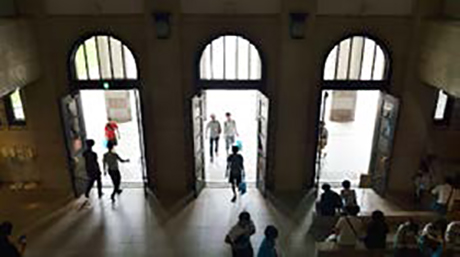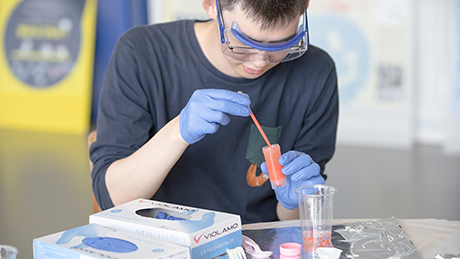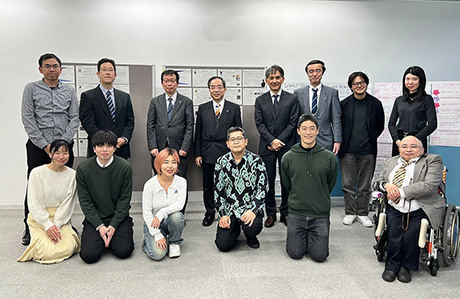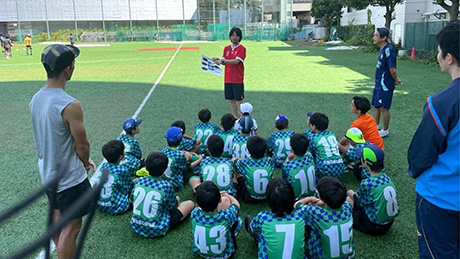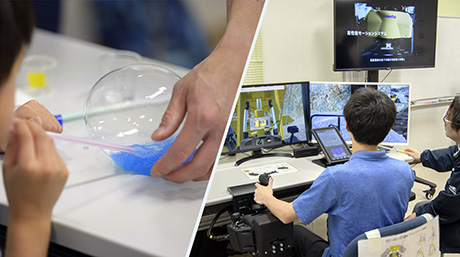Life Science and Technology News
DLab Dialog Days 2022 discusses "Re-DESIGN our future society" through virtual symposium and workshop
On March 5 and 6, the Laboratory for Design of Social Innovation in Global Networks (DLab) hosts DLab Dialog Days 2022 "Re-DESIGN our future society," a two-day virtual event that initiates discussions on future society together with over 200 Tokyo Tech faculty, staff, students, alumni, and members of the public.
This is the second year that DLab has held an online event to share the year's achievements with the broader world. This year's two-day event with the theme of "Re-DESIGN our future society" had a new workshop as well as a symposium presenting the efforts of the 2021 academic year (AY2021).
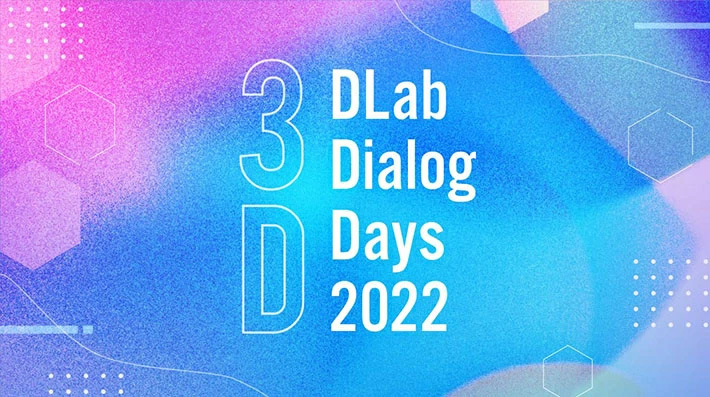
Program
Day 1 Symposium
- 1.Introduction & Activities
- 2."Seeds for our future world": Our future envisioned by students with DLab Partners
- 3."Future research sprouts": To the realization of the future image from 2021 DLab Challenge Research Grant
- 4."Trunk of future creations": DLab Future Techscapers video series
- 5.Closing
Day 2 Workshop
- 1.Orientation
- 2.Keynote Speech 1 "Where Do Coronaviruses Come From? What Are They?"
- 3.Keynote Speech 2 "FUTURE: re-generative!"
- 4.Group work and individual work
- 5.Closing
*Participants' affiliations and job titles are those as of when the event was held.
Event Report
Day1 Symposium on March 5
The symposium on March 5, the first day of the event, began with opening remarks conveying DLab's stance of envisioning "future we all aspire" with stakeholders representing diverse backgrounds of society by DLab Director Isao Satoh, Provost and Executive Vice President for Institute Strategy.
1. Introduction & Activities
In the first session "Introduction & Activities," DLab Associate Director Naoto Ohtake, concurrently associate director-general at the Institute of Innovative Research introduced DLab activities which range from studying our future world to supporting research activities and building research out into university courses. He also explained the action framework in which various members from Tokyo Tech and beyond envision the future together.
Two major achievements from past DLab activities were also presented: The "Tokyo Tech Future Chronology![]() " that sorts out "future scenarios" depicting the "future we want" by era; Vision 2020 "Transchallenge"
" that sorts out "future scenarios" depicting the "future we want" by era; Vision 2020 "Transchallenge"![]() that changes the concept of "challenge" as an opportunity to take on any challenge confidently.
that changes the concept of "challenge" as an opportunity to take on any challenge confidently.
2. "Seeds for our future world": Our future envisioned by students with DLab Partners
Future world envisioned by students with the cooperation of companies
At DLab, "encouraging society and the next generation and raising awareness" are key pillars along with research and academic evolution and enhancement. One of the initiatives is an course "Introduction to the Design of Future Society![]() " which aims to specify a vision of a 2050 future world you want to live. In the session "Seeds for our future world": Our future envisioned by students with DLab Partners, some undergraduate students in groups presented their visions.
" which aims to specify a vision of a 2050 future world you want to live. In the session "Seeds for our future world": Our future envisioned by students with DLab Partners, some undergraduate students in groups presented their visions.
From AY2021, members of DLab Partners, an organization consisting of companies and groups that support DLab's activities, have participated in the "Introduction to the Design of Future Society" course, and collaborated in presentations from the standpoint of companies and dialogs with students. Prior to the presentation by students, DLab member Hajime Nitta, head of the Research Development section at Tokyo Tech's office of Research and Innovation explained about DLab Partners.
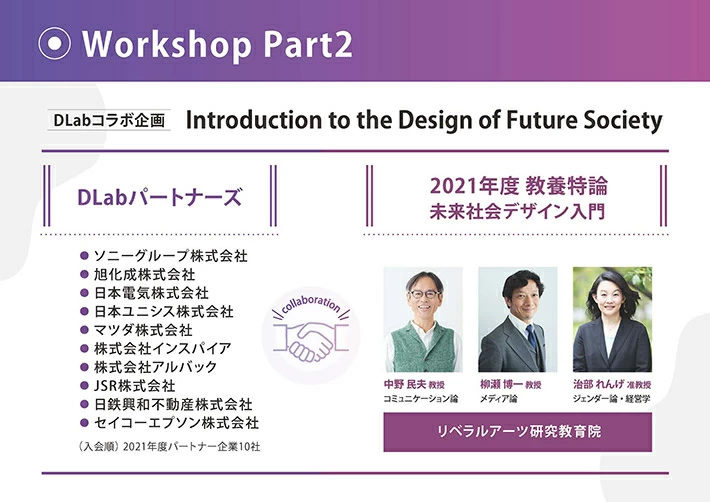
Collaboration between DLab Partners and the course "Introduction to the Design of Future Society"
After an introduction by Professor Hiroichi Yanase, DLab member and an instructor of the course, Institute for Liberal Arts, three teams of undergraduate students presented the following visions of our future world selected as "excellent works" in the class.
- Team A "‘Re: experience’ finally implemented in medicine: Innovation in the treatment of depression":Realistic hands-on experience sharing using a system that can record and replay memories is possible, and treatment is performed by providing patient-tailored hands-on experiences.
- Team B "Body Sharing System":By applying technology that converts consciousness into data, you will be able to load your consciousness via a server into a body active in the real world and control it. The bodies are placed all over the world and shared for use.
- Team C "The whole world has finally unified as a single nation!!!": With the advent of eye chips equipped with a translation app, it is possible to freely interact with partners in countries in the VR space, producing a unified VR nation. That trend will produce a unified world nation that shares currencies while retaining borders.
After the presentation of each team, other course instructors, DLab members Professor Tamio Nakano, Institute for Liberal Arts and Associate Professor Renge Jibu, Institute for Liberal Arts also joined and asked questions and commented on the content.
In addition, some DLab Partner members who participated in the course from Asahi Kasei, JSR, NEC, and Mazda Motor joined in a panel talk with students about the state of the course and the content of the presentations. One company member commented that people tend to be conscious of the merits of using technology, but it is helpful to consider the potential risks.
3. "Future research sprouts": To the realization of the future image from 2021 DLab Challenge Research Grant
Description of research to create our future world
In the following "Future research sprouts," principal investigators of "DLab Challenge Research Grant AY2021![]() " presented their on-going projects. This research grant supports research leading to a future world envisioned by DLab and the creation of new academic fields necessary for that purpose.
" presented their on-going projects. This research grant supports research leading to a future world envisioned by DLab and the creation of new academic fields necessary for that purpose.
Research on "Future life in the fusion of update-speed gap between communication technology and architecture" (Assistant Professor Sangyop Lee, Institute of Innovative Research) tackles the problem of radio wave attenuation due to building shields (which can be a major barrier to next-generation wireless communication) through examination of communication characteristics and building structure. "Establishing a method for building future narratives to increase stakeholders' commitment to future scenarios by connecting human and information technology" (Assistant Professor Yuki Taoka, School of Environment and Society) creates a mechanism for the parties concerned to work on creating their own future scenarios through the development of methods for extracting future life challenges and virtual future experience methods.
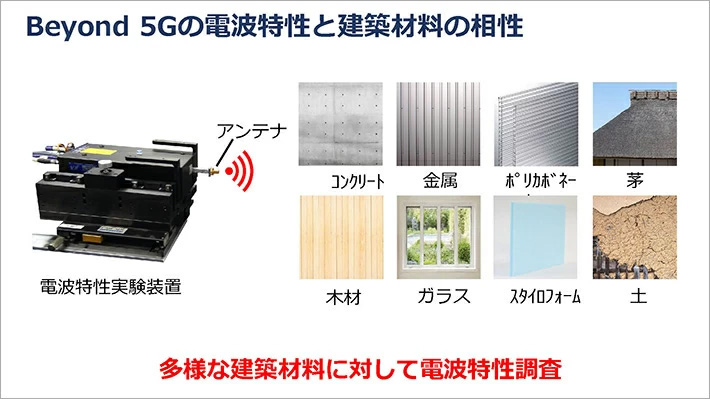
Compatibility of Beyond 5G radio wave characteristics and building materials (from presentation by Assistant Professor Sangyop Lee)
"Construction of a network of researchers for interdisciplinary collaborative research based on the enhancement of serendipity" (Assistant Professor Yuno Tanaka, School of Environment and Society) aims to create new value by building a network that serves as an environment where researchers with different backgrounds can learn about each other and stimulate one another. "Tomorrow's studio: Smart creation using mixed reality for enhancing real-time interaction in design education" (Assistant Professor Yuval Kahlon, School of Environment and Society) will help improve the efficiency of remote education by developing a cyber-physical workspace that utilizes MR (Mixed Reality) technology and AI.
After each presentation, DLab members Takao Kuramochi (deputy director-general, Center for Research and Development Strategy, Japan Science and Technology Agency), and Junko Mokuno (Vice President of Trail Inc.), and Professor Noriyuki Ueda (dean of the Institute for Liberal Arts) delved into the content as commentators while asking about key points of the research and the results of the initiated research, and then the researchers answered questions asked by the participants.
4. "Trunk of future creations": DLab Future Techscapers video series
Video on research to the realization of future scenarios
The final session on the first day of the event was "‘The Trunk of Future Creations’: DLab Future Techscapers Video Series." This part introduced a new video series "DLab Future Techscapers," in which researchers at Tokyo Tech talk about the science and technology necessary to realize future scenarios and future worlds envisioned by DLab through dialog and research presentations, and featured talks by planners and video performers.
First, Yumi Ozaki (group leader of the public relations division) gave an overview of the project, the origin of the series name expressing the idea that "combining technology and landscape will let us perceive the world through technology", and the following three categories within the series.
3 categories of video series "DLab Future Techscapers"
- 1."DLab dialog for the future":Front-line researchers with different specializations have a dialog in a roundtable discussion that lasts about 45 minutes, following specific themes related to future scenarios.
- 2."DLab Challenge": this category looks at research adopted for the research support initiative by DLab (DLab Challenge) in about 5 minutes.
- 3."Future Techscapers": In about 5 minutes, it shows the up-and-coming research of Tokyo Tech, which pursues cutting-edge subjects and engages in new research areas.
In addition, they broadcast a special video with highlights of each video currently released on YouTube. After that, Director Sato and Professor Yanase (facilitated the 1st and 2nd videos of "DLab dialog for the future") and Vice President Nobuyuki Iwatsuki (the mastermind of the project) moved to a panel talk to discuss the contents of the video. At the beginning, Professor Iwatsuki introduced the background of how the project started: "I want to communicate to a large audience the research on future scenarios at Tokyo Tech."
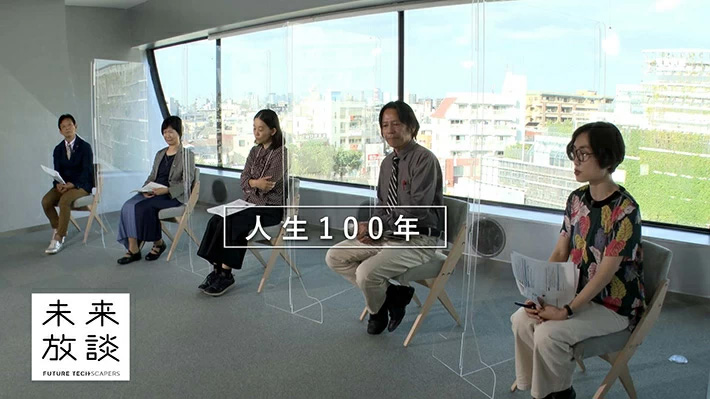
From the Future Techscapers video
They gave their comments on the first DLab dialog for the future "Sustainable energy development![]() ": "While focusing on individual technical theories, we gained a common understanding that systems of creating, transporting, storing, and using energy are important, with an awareness of politics, geopolitics, and the economy." They also expressed their thoughts on the second dialog "
Impacts of a 100-year lifespan
": "While focusing on individual technical theories, we gained a common understanding that systems of creating, transporting, storing, and using energy are important, with an awareness of politics, geopolitics, and the economy." They also expressed their thoughts on the second dialog "
Impacts of a 100-year lifespan![]() ": "Experts from a wide range of fields such as life science, religion, gender and family, and mental and physical care gathered to discuss with a comprehensive perspective that goes beyond the humanities and sciences." After a question-and-answer session with the participants, the session ended after a summary by Professor Yanase: "Technology contains seeds that predict the future. By widely disseminating Tokyo Tech's research, we would like to use it as a force to realize a better future sooner."
": "Experts from a wide range of fields such as life science, religion, gender and family, and mental and physical care gathered to discuss with a comprehensive perspective that goes beyond the humanities and sciences." After a question-and-answer session with the participants, the session ended after a summary by Professor Yanase: "Technology contains seeds that predict the future. By widely disseminating Tokyo Tech's research, we would like to use it as a force to realize a better future sooner."
5. Closing of Day1 Symposium
The symposium on the first day, in which more than 100 people participated, ended with closing remarks by Vice President Kaoru Kuwata. In the greeting, after looking back on each session of the day, drawing on the words spoken by Professor Nakano in a session "the act itself of individuals envisioning ‘what they want to do in the future’ will gradually shape the future" and the points from the participants that it is important to share a vision of the future, they expressed the determination to "continue acting together with society."
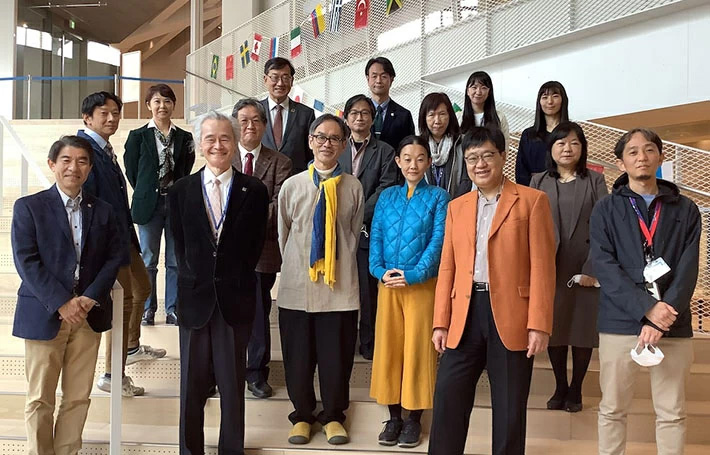
Day1 Symposium speakers and management staff
Day2 Workshop on March 6
At the workshop on March 6 as with the symposium the day before, we invited a wide range of participants from the public, including high school students and corporate representatives worldwide, to think about the future while doing group work.
1. Orientation
In the opening remarks of the day, President Kazuya Masu conveyed his hope that the event would be meaningful to the participants. He emphasized the importance of imagination in the creation of the future by citing the words of the writer Jules Verne, "Anything one man can imagine, other men can make real."
Next, Associate Director Ohtake talked about the meaning of "Re-DESIGN our future society". He pointed a future scenario No. 8 "Enjoy a strong, complete, balanced home," which was predicted to be realized in 2040, was unexpectedly realized in 2020 due to the COVID pandemic.
DLab members Professor Nakano, Professor Asa Ito (director of Future of Humanity Research Center, Institute of Innovative Research), and Associate Professor Yuta Suzuki (Institute for Liberal Arts) facilitate the workshop. Professor Nakano described the program for the day. Professor Ito and Associate Professor Suzuki gave a talk on the purpose of the day's efforts, such as the need for "Re-DESIGN" because things do not go as planned.
2. Keynote Speech 1 "Where Do Coronaviruses Come From? What Are They?"
Deeper understanding of the coronavirus that has brought about major changes in society
The first session of the main part, as a premise to later work, is Keynote Speech 1 "Where Do Coronaviruses Come From? What Are They?" to gain a deeper understanding of the coronavirus that caused great societal changes. Professor Yuki Yamaguchi (School of Life Science and Technology, member of DLab) explained the properties and mechanisms of viruses and vaccines from an expert's point of view.
The speech begins with the nature and origin of the virus in general, the history of infectious diseases that have had a major impact on human history, and then moves on to the nature of the coronavirus.
In the topic of vaccines that followed, in addition to analyzing the components and mechanism, he explained the advantages of the mRNA vaccine used for inoculation in Japan, namely that it is easy to design and can be mass-produced in a short period of time, and that it is not prone to remain in the body.
At the end of the speech, he pointed out that we should be prepared for the "next one" to appear in the not-too-distant future, based on the fact that we had SARS in 2002, MERS in 2012, and COVID-19, so a new kind of coronavirus epidemic comes at intervals of less than 10 years. He also presented the remarkable progress of biomedical science research in the COVID crisis. The virus's pathology was unraveled at an unprecedented speed and vaccines which previously would have taken at least four years to develop were developed in less than one year.
After the speech, Associate Professor Suzuki talked with Professor Yamaguchi. They described prospects for the future: "Although it is difficult to completely predict the future circumstances, with increased weapons against the novel coronavirus thanks to the development and approval of vaccines and oral medicines, it should be possible to manage the situation in a broad sense by the end of this year."
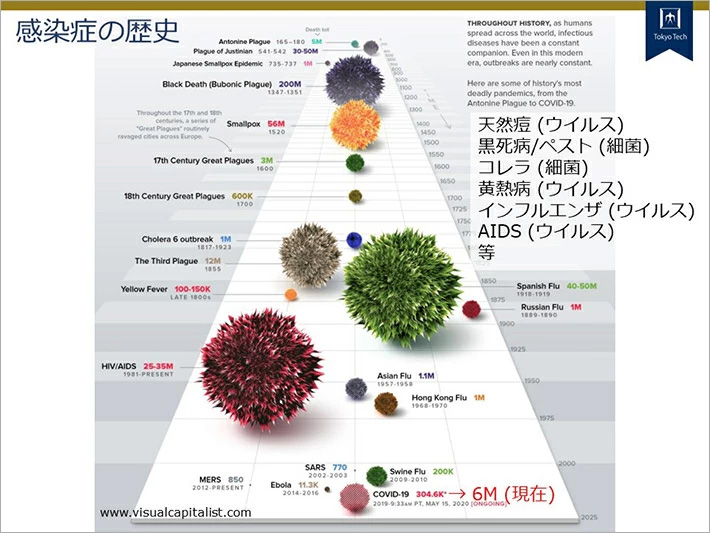
History of infectious diseases (from Keynote1 by Professor Yamaguchi)
3. Keynote Speech 2 "FUTURE: re-generative!"
Ways of thinking about future from WIRED JAPAN Head of Editorial Content
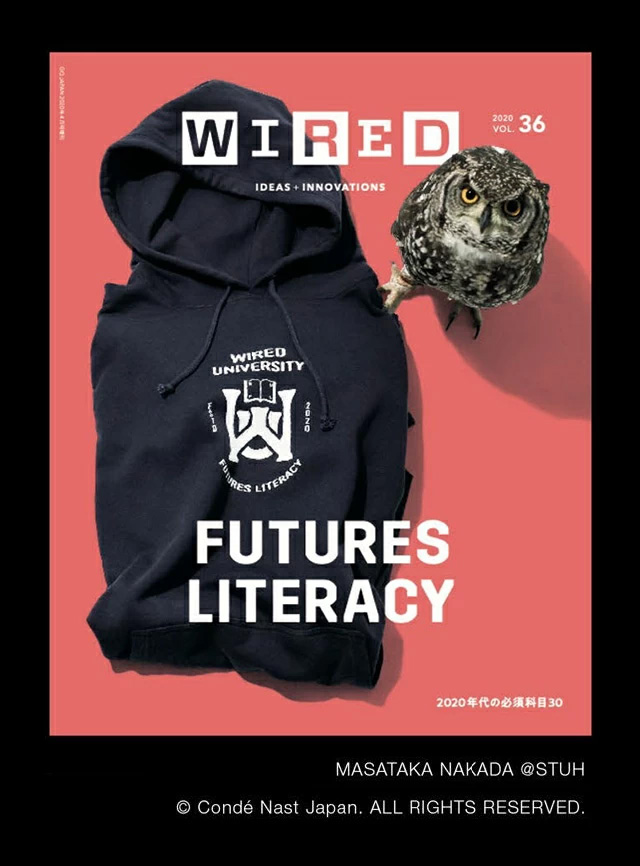
FUTURES LITERACY VOL.36 WIRED JAPAN (from Keynote 2 by Matsushima)
Keynote Speech 2 "FUTURE: re-generative!" is provided by Michiaki Matsushima, WIRED JAPAN![]() Head of Editorial Content, which has been thinking about how technology will change our future for about 30 years with "fighting optimism." He dug deeper into "Futures Literacy" for imagining and creating the future.
Head of Editorial Content, which has been thinking about how technology will change our future for about 30 years with "fighting optimism." He dug deeper into "Futures Literacy" for imagining and creating the future.
Matsushima, in the words of philosopher Friedrich Nietzsche that "the future influences the present just as much as the past," pointed out that how we perceive the future will affect our current state. He opined that "Though continuous unpredictable changes makes us difficult to map out one big future vision, it may be possible for each person to consider and map out some plural "futures.""
He also mentioned that human beings tend to think about the future while looking at the past. This can lead to a pessimistic view of the future. Matsushima proposed a backcast approach that looks back from the future towards the present. He said that in the 22nd century, history textbooks might comment that "in the pre-pandemic era, the Internet was rarely used."
In addition, he pointed out that by looking at the present from the distant future, "re-generation" is taking place in which the present and the past are repeatedly rewritten by the future.
In the following dialog, Professor Ito pointed out that "in order for each individual to map out their own vision of the future, each person must have the technology in their own hands and master it. But in modern times, our understanding is that technology is monopolized by large IT companies." Matsushima responded with an example of a movement in the online world to take back such technology into the hands of individuals, and mentioned that it was important for organizations and media such as DLab to keep pace with it.
4. Group work and individual work
Re-designing our future through group dialog
Each participant started to work in groups of four. Professor Nakano started a group discussion using Zoom's "breakout room" function. He mentioned the four principles "no criticism allowed," "quality over quantity," "freewheeling," and "connecting is welcome," as well as to enjoy.
The work was divided into three stages, and the first step was to discuss "what you couldn't do or what was lost due to the COVID pandemic." After a brief introduction, participants shared fact-based experiences such as not being able to go on trips and the increased difficulty of going out or meeting without a purpose. Furthermore, they delved into the significance of what was lost due to such changes, such as fewer random encounters with new things and people.
The second step was "What I was able to do and what I gained from the COVID pandemic." The re-arranged group dialogs with new members began. Participants commented "remote meetings have become commonplace, and my network of friends has spread all over the country," "it's a catalyst for changing irrational practices and procedures," and "it's an opportunity to think about what is really important to me."
Final step was a personal work that summarized what was confirmed through the dialog of this day as a single-page "letter to future generations." The letters to friends, junior colleagues, and descendants in the future contain their intention to reconsider approaches and perceptions, and their thoughts on the future. Following the unprecedented experience of the COVID pandemic, what can we pass on to future generations as "good ancestors"? The whole work was completed after sharing the letters in small groups and sharing overall impressions.
5. Closing
Continuing to design the plural "futures that we want"
More than 100 people from Tokyo Tech and beyond participated in the day's workshop, and the total number of participants in the two-day event exceeded 200, including international participants. Comments from the participants included "I can now see the positive sides of the COVID pandemic, which I thought was purely negative" and "I realized once again that envisioning the future is the first step to creating a better future."
DLab Dialog Days 2022 was held in a format that emphasized the in-person feeling. For example, at the symposium on the first day, DLab members gathered at Tokyo Tech's Taki Plaza to hold a social distanced panel talk. In addition, interactions in a virtual environment were further strengthened holding Q&A with participants arranged for each session. The element of "Dialog," which is one of the basic principles of DLab and is also the title of the event, has been further enhanced.
In the closing remarks on the finale of the two-day event, Director Satoh expressed his gratitude to the participants and once again called for their cooperation in future activities. "The future designing that DLab is aiming for is precisely the "plural futures" that Matsushima talked about today. We create the future that each person wants, by thinking about what kind of science and technology is necessary to realize it."
Ideas from various perspectives are indispensable for weaving "plural futures." DLab will continue to promote activities for the design and realization of the future that we aspire through events and collaborations with off-campus parties such as DLab Partners.
- Laboratory for Design of Social Innovation in Global Networks (DLab)
- Laboratory for Design of Social Innovation in Global Networks (DLab) | Organization | About Tokyo Tech
- Family, human body, religion, and care for longevity society | Outreach Stories | Outreach
- Toward carbon-neutral society through emerging technology | Outreach Stories | Outreach
- DLab Dialog Day Spring 2021 brings together over 130 participants | Tokyo Tech News
Designing our future together
By gauging the needs and desires of society through dialogue, and by designing our future together, DLab aims to create a brighter, more prosperous world.
Laboratory for Design of Social Innovation in Global Networks (DLab)![]()
Contact
Laboratory for Design of Social Innovation for Global Networks
E-mail : lab4design@jim.titech.ac.jp
-
-
- Department of Architecture
and Building Engineering - Department of Civil
and Environmental Engineering - Department of Transdisciplinary
Science and Engineering - Department of Social
and Human Sciences - Department of Technology and Innovation Management Professional master's degree program /Department of Innovation Science
- Department of Architecture

